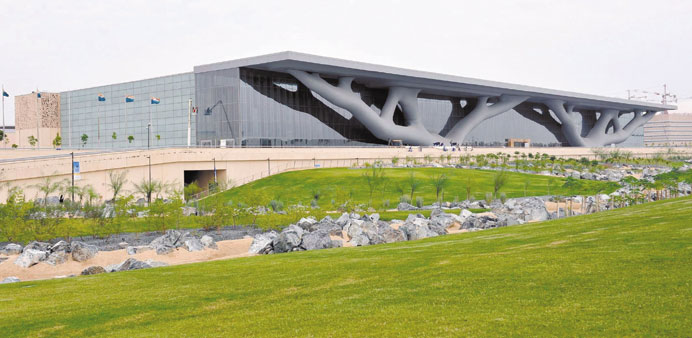The Qatar National Convention Centre: a popular venue for exhibitions and conferences in Doha.
By Sarah Khalifa and Emma Higham/Doha
The importance of exhibitions and conventions to Qatar’s national economy is evidenced by the increasing number of events taking place.
The Qatar International Motor Show, Doha Jewellery and Watches Exhibition, Cityscape Qatar 2015 and QIMA 2015 are only a few of the many events taking place this year in an increasing number of venues, including the Qatar National Convention Centre and the Doha Exhibition Centre.
Given the previous anticipated growth in this market segment, a new law was introduced to develop the applicable legal framework. Law No (17) of 2012, known as the “Exhibitions Law”, regulates all exhibitions and the organisers of exhibitions within the State of Qatar and gives the Qatar Tourism Authority (QTA) oversight over all such licences. In this article we will consider the requisites and parameters of the Exhibition Law as well as its application and penalties for non-compliance.
The scope of the law’s remit is extensive as “exhibition” is defined as “any party, event or festival intended primarily for exhibiting samples, goods, equipment or models or services related to the commercial, industrial, banking, agricultural, tourist, real estate, professional, technical, or sports sectors or any other sector, whether these exhibits are national or foreign products, for the purposes of publicity, marketing, promotion or sale”.
Many activities and sectors are encompassed under this definition, as was the intention, in order to properly regulate and oversee the quality and output of the growing number of exhibitions held within the state, to ensure that they are held in appropriate venues, and that the goods and services being exhibited are properly authorised before reaching the public.
The law requires anyone holding an exhibition as well as any offices organising, setting up or operating exhibitions to obtain a licence from the QTA.
The licence for holding exhibitions can vary and depends largely on the duration of the exhibition, ie. anywhere between one to four days, whereas the licence term for offices is one year.
It is worth noting that weddings, galas, concerts, and other entertainment events are not regulated by the Exhibitions Law; a licence from the Ministry of Culture Arts and Heritage is required for these events.
A person licensed to hold an exhibition in Qatar must comply with the exhibition period specified in the exhibition licence, hold the exhibition in the location specified in the licence and ensure compliance of any requirement for all of the exhibits held within the exhibition.
If holder of the licence has assigned the licence to a third party without the consent of QTA, or is found performing any other business activities or works that contravene the licence or violating public order or morals or engaging in anything that harms the State’s reputation or its national security, QTA may invalidate or cancel the licence.
Penalties for failure to obtain an exhibition licence include a prison sentence of up to one year and a fine of no less than QR20,000 and no more than QR100,000, notwithstanding any other stricter penalties provided in any other applicable law.
Whereby penalties for failure to comply with the requirements and restrictions of an exhibition licence, once it has been granted, include a penalty of no less than QR10,000 and no more than QR50,000.
The Exhibition Law prohibits exhibition organising offices to make any changes to the trade name, ownership or management of the office without serving written notice to QTA of the changes.
In addition, licensees must provide proper opportunities to train, develop, and qualify Qatari nationals technically and administratively on organisation of exhibitions and relevant work as well as provide QTA with annual training programme schedule.
Upon cessation or termination of a licence, an exhibition organising office, must make an announcement of the same, at its own expense, in any widespread national daily newspaper in the form prescribed by QTA.
Those holding licences for offices organising exhibitions generally serve as applicants for licences for holding exhibitions; as such offices are familiar with the requirements and the application process.
The application timeframe provided in the Exhibition Law is swift, where approval (or rejection) is granted within 15 days from the date of submission of the application and licences may often be issued in shorter timeframes.
Regulation of the types of exhibitions allowed in the state, their duration, the requirements of the exhibits, the venues where exhibitions may held, and the organisers of the exhibitions themselves ensures that a minimum standard is maintained, encourages raising of the bar on the quality and operation of exhibitions and enhances the level of professionalism.
The announcement of the Qatar National Tourism Sector Strategy 2030 and the push to promote “Destination Qatar” has cemented the QTA’s role and its integral part in achieving the nation’s goals for 2030.
Exhibitions as a market segment serves as a major contributor to the growth of the tourism sector, and with QTA’s oversight it is likely to be an ever-growing and important market in the years to come.
Note: Qatari laws (save for those issued by the Qatar Financial Centre to regulate internal business) are issued in Arabic and there are no official translations, therefore for the purpose of drafting this advice we have used our own translations and interpreted the same in the context of Qatari regulation and current market practice.
*If you would like any further information please contact Sarah Khalifa ([email protected]) or Emma Higham ([email protected])

